Home alone, but loneliness doesn’t have to be a constant companion for Singapore’s seniors
Experts said living alone and being socially isolated are not the same thing. Seniors living on their own can have fulfilling lives, while seniors living with family can feel lonely as well.
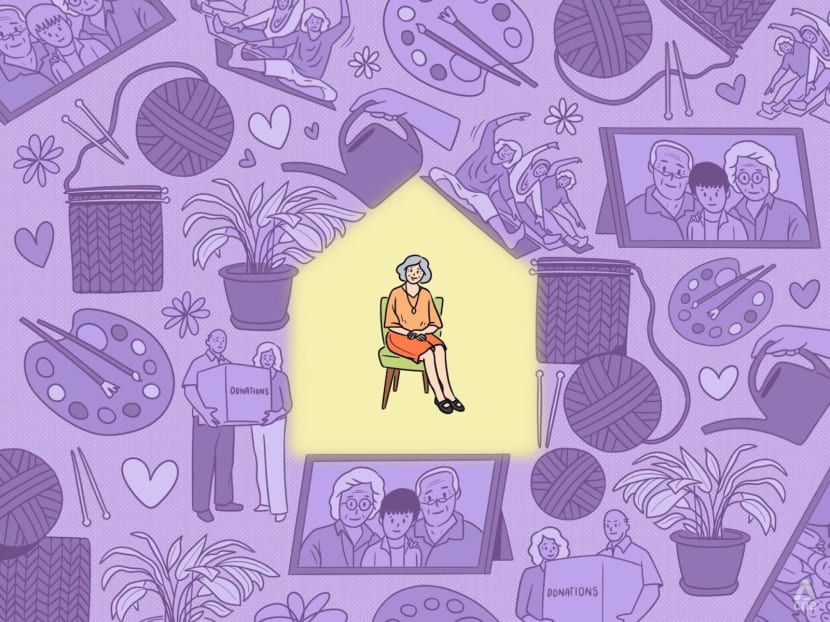
Community support is key to helping seniors age well and tackle loneliness. (Illustration: CNA/Nurjannah Suhaimi)

This audio is generated by an AI tool.
Ms Nancy Lim, 73, has lived alone for more than 20 years – and she loves it that way.
"You can do whatever you want," said the retiree. "If you're staying with somebody else, you can't do what you want all the time."
Ms Lim used to live with her father in a four-room flat in Serangoon before he died in 2003. She has never married and has no children.
"If I forget my towel after bathing, I can just walk out – I don't have to bother (about covering up). Of course, my blinds are closed," she added.
Finding it difficult to maintain her previous four-room flat, she bought a senior-friendly flat just down the road five years ago. Ms Lim said she liked the unit as it came with built-in cabinetry along with grab bars in the bathroom and other areas.
Despite living alone, her life is far from solitary and sedentary.
Ms Lim had thought that retirement six years ago would mean a slower pace of life after years of working as a garment merchandiser, which often involved bi-annual trips to Germany and quality control checks. But even after stepping back from work, her days remain filled with non-stop activity.
Mondays start with meridian tapping therapy at the community centre, followed by afternoon sewing sessions and then the occasional drone-flying session at Bishan Park in the evening. Tuesdays are busy with chair Zumba and line dancing, sometimes in preparation for public performances.
On Wednesday mornings, Ms Lim can be found line dancing at the Bless Community Services centre in Yio Chu Kang before heading for stretching classes in Serangoon north.
"I have to keep myself busy as I age," said Ms Lim. After she hurt her arm last year and couldn't exercise for nearly two months, she said her muscles had noticeably atrophied.
Although Ms Lim is close to her nine siblings, she has never considered moving in with any of them as they all have their own families.
"Even though I don't have a spouse or children, I have many friends. I (am close to) my nephews and nieces and they're all very helpful," she said.
"I'm not lonely and I don't feel that I'm lacking anything. The most important thing is to take care of my health," Ms Lim added. She takes medication for high blood pressure but is otherwise healthy.
Another senior who enjoys living alone is 77-year-old Madam Lim Seng Whay (no relation to Ms Nancy Lim).
Her husband died suddenly in 2007 of an arterial blockage. In 2016, her youngest son and his family moved out of her three-room Bukit Batok flat, leaving her on her own.
The mum-of-three said that once she was by herself, she felt like a "butterfly", free to spread her wings and join the activities organised by the Residents' Network and active ageing centres as she pleased.
"I flew and flew," said Mdm Lim of her new chapter in life.
Now, she spends her mornings exercising and afternoons having lunch with friends or volunteering to help other seniors in her community. Her three sons and their families frequently check in on her and spend time with her.
Although she maintains close relationships with them, Mdm Lim enjoys the freedom that living alone provides.
"You can do anything you want. But if you live with (your children), it can sometimes be inconvenient. You have to take care of the grandchildren, think about what to cook for them – it can feel like a kind of obligation," said Mdm Lim.
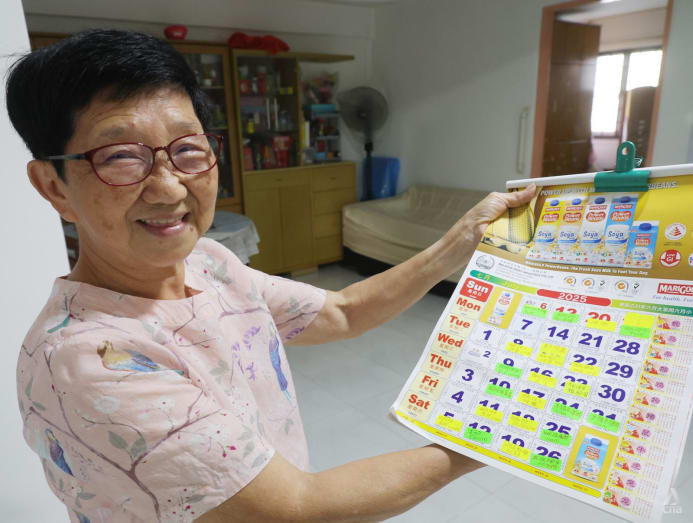
While the two women seem to be the very models of independent ageing, some seniors have it harder.
Mr Rajendran, 61, also lives alone in a two-room rental flat. However, he spends most of his days at home, and visits from family or friends are rare.
The former hospital attendant stopped working at the age of 35 after a fall that injured his spine and led to a brain condition. He never married and has no children.
Now on long-term government assistance, he spends most days at home cooking fish curry or biryani for one, watching movies and managing his chronic health issues, including heart problems and gout.
Mr Rajendran's nephew visits every so often to eat with him and spend the night at his flat in Eunos.
Asked if he would consider moving in with his nephew, Mr Rajendran said: "He has a wife and children. I don't want to disturb them."
Two of Mr Rajendran's siblings, a sister and a brother, have died, while another sister is critically ill. Mr Rajendran makes a point of going to the active ageing centre a couple of times a week so that people can "see" him.
Given his medical condition, he fears that something might happen to him while he is alone at home and no one would know about it.
But despite his regular visits to the active ageing centre, he has not formed any deep friendships there.
"If someone's friendly, I talk to them. We are both happy, then okay," he said.
"But if they're not nice or don't like me, then forget it. Don't talk to me, just go away. That's my policy."
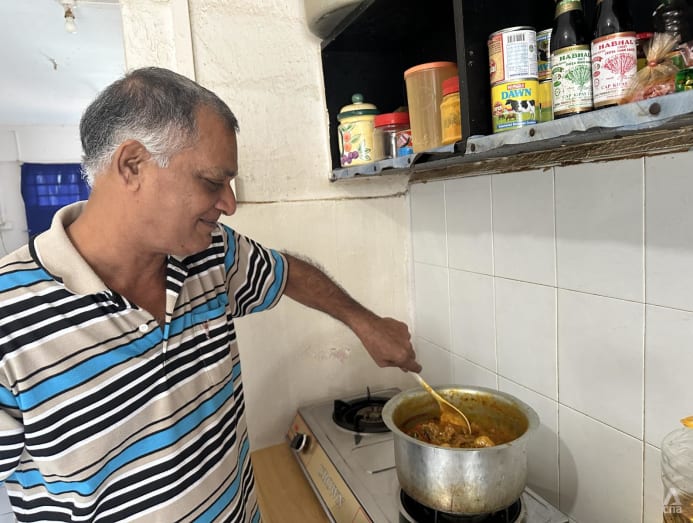
Singapore is poised to become a super-aged society in 2026, with more than one in five of the population expected to be 65 years old or older. As such, home-alone seniors are set to make up a significant proportion of society.
The number of seniors living alone in Singapore has more than doubled over the past decade, outpacing the overall growth in the senior population.
The overall number of residents aged 65 and above went up about 75 per cent, from 431,601 in 2014 to 753,905 in 2024
But in a report issued in July 2025, the Ministry of Social and Family Development said the number of such seniors living in resident homes more than doubled in the last decade from 42,100 in 2014 to 87,200 in 2024.
And experts say that not only are more seniors living alone, but many are doing so by choice and thriving.
CNA TODAY interviewed 11 seniors living by themselves and uncovered various reasons for their living arrangements, from personal choice and a desire for independence to circumstances such as widowhood and lifelong singlehood.
"The whole ageing landscape is shifting," said Associate Professor Angelique Chan from the Centre for Ageing Research & Education at Duke-NUS Medical School (Duke-NUS).
"The way in which we view ageing and how to support older adults needs to shift as well."
Assoc Prof Chan noted that the needs of the current generation of seniors differ from those of previous cohorts.
Policies for Singapore's Pioneer Generation, comprising individuals from before 1950, may not work for the Merdeka Generation, born from 1950 to 1959.
"They're going to want different things. They're going to want more autonomy to age the way they want to," said Assoc Prof Chan.
Associate Professor Helen Ko, from the Singapore University of Social Sciences (SUSS), added: "Many of the current cohort of seniors were the 'sandwiched generation', previously responsible for taking care of their ageing parents while raising their children and juggling employment.
"They look forward to having time for themselves at this life stage, to pursue what they had missed in their younger days."
Nanyang Technological University's Assistant Professor Shannon Ang noted that later-born cohorts tend to be more affluent and better educated than earlier generations.
As a result, living alone is becoming a less reliable indicator of risk or vulnerability and more of a simple description of their living arrangement.
He added that to better address issues facing vulnerable seniors who live alone, it is vital to consider their entire life course as context. This includes whether they were ever married, have children, their financial situation and employment history.
Addressing the challenges faced by seniors living alone requires looking beyond short-term interventions to understand the broader forces that shape their ageing experience, he said.
Associate Professor of Social Work Corinne Ghoh from the National University of Singapore said that in Singapore, it has traditionally been expected for older adults to live with their children.
But this practice is now less strongly upheld due to modernisation and more nuclear families.
"This norm of co-residence with older parents as a form of filial piety is not embraced as strongly as before," said Assoc Prof Ghoh.
"However, this does not mean that filial piety is being eroded in our society. Rather, it is that filial piety is being reconstructed."
She added that overall, adult children and older parents enjoy good intergenerational relationships. Even though they are living apart from each other, adult children and older parents still meet for family activities and meals together.
"The phenomenon of elderly living alone should be examined to understand the diversity and not simply be viewed as older people being discarded from society," said Assoc Prof Ghoh.
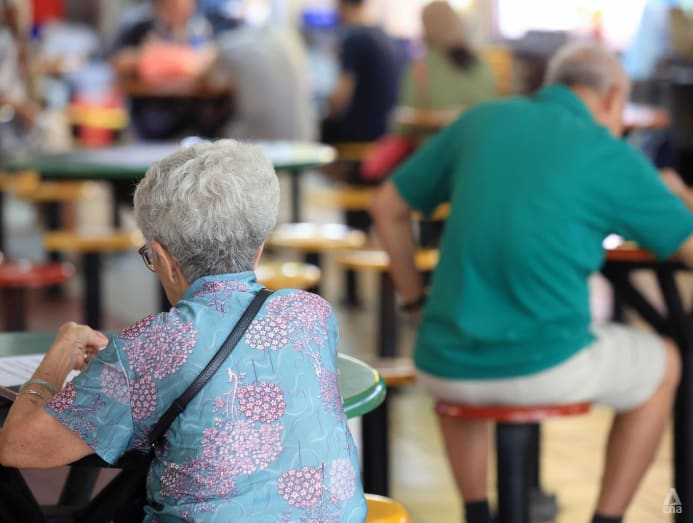
LIVING ALONE DOES NOT MEAN LONELY
Experts told CNA TODAY that seniors may live alone due to various factors. Some are widowed or divorced, while others never married or simply prefer their independence.
Assoc Prof Chan noted that three major demographic shifts are contributing to the rise in seniors living alone: Higher rates of non-marriage, rising divorce rates, and, as the population ages, a growing number of older people, especially women, living alone.
She noted that there is a growing phenomenon of couples getting divorced in their late 50s once their kids have moved out, which also contributes to the increase in seniors living alone.
In 2024, there were 1,615 divorces involving individuals aged 55 and above – more than triple the 510 cases recorded in 2004, and a 51 per cent increase from 2014 when the figure stood at 1,068, according to data from SingStat
Principal research scientist Dr Ad Maulod, also from the Centre for Ageing Research & Education at Duke-NUS, added that divorces are now seen as less of a taboo, which explains the rise.
"It speaks also to the agency that older people have today to exercise their desires, demands and their preferences," said Dr Ad.
Assoc Prof Ghoh said another reason seniors might choose to live apart from their children is to enjoy higher government subsidies and relieve their children of the financial burden of caring for them.
Means testing for subsidies is calculated as the monthly household income per person, which is determined by dividing the total gross income of all household members by the number of people living at the same registered address.
For applicants with no income, such as retirees, the annual value of their home is used instead. If a senior lives with their adult children who earn high incomes, it can reduce or disqualify them for certain subsidies.
But at the same time, Assoc Prof Ghoh noted that there are other policies that incentivise families to stay close or together and encourage family relations and continual mutual support.
For example, under the HDB Proximity Housing Grant, families (married and engaged couples) who are homebuyers can receive up to S$30,000 if they choose to live with their children or parents. Those who want to live close to their families can receive S$20,000.
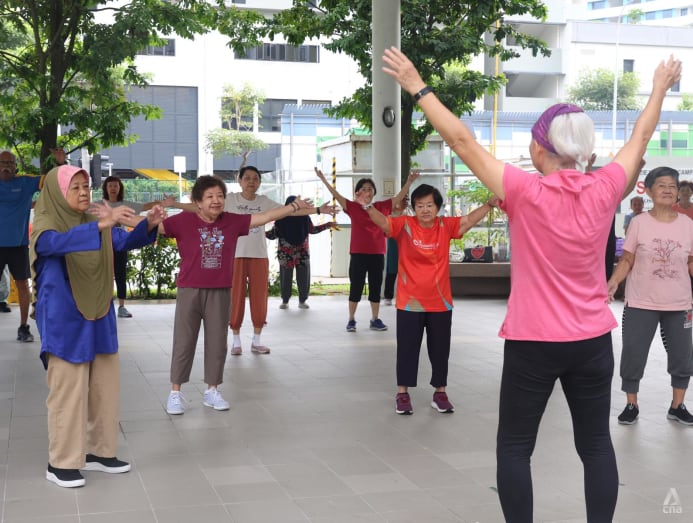
Dr Ad added seniors might also just want to age in place – that is, to continue living in a familiar neighbourhood, surrounded by their friends and amenities that they are used to, such as hawker centres and wet markets.
Agreeing, Assoc Prof Ghoh said that seniors living alone have greater control over their time and more freedom to engage in their preferred life activities.
Many seniors prefer not to be burdened by grandparenting duties or expectations from their children, noted SUSS' Assoc Prof Ko, even if they are happy to help occasionally.
Hence, living alone these days for the elderly does not always mean feeling lonely, the experts said.
"We need to think about living alone on one hand and being socially isolated on the other hand. They are two different things," said Assoc Prof Chan.
"Being socially isolated is a structural concept. You could say there are more people living alone, but if you drill down, not all of them are lonely," she added.
Agreeing, Assoc Prof Ghoh said other studies have shown that older persons living alone and with a good social network of support can continue to live well and are not socially isolated.
"Rather than stigmatising seniors living alone as lonely and sad, we could perhaps shift our narrative to encouraging seniors to build their social support networks in later life as the key to living well."
IMPORTANCE OF COMMUNITY
For seniors living alone, having a community is not just pleasurable, it's essential. This is especially true for those with limited mobility.
Ms Liew LP, 75, has lived in her two-room rental flat in Eunos for nearly four decades. She suffers from multiple chronic conditions and has undergone several surgeries. Numbness in her legs and a history of falls have left her largely confined to her home.
"Someone must bring me out. I cannot do it alone," she said. "If someone brings me out, I will be happy."
Ms Liew said that ever since her medical condition prevented her from continuing working as a hotel steward, the days pass slowly for her.
"Every day I'm not happy. If I can go downstairs, I will. But if I can't, I won't," said Ms Liew, who has asthma and spine issues. "I feel very sad when I can't go down."
On days when no one visits, she locks the door, shuts the windows and just sleeps.
Although emergency alert buttons have been installed at various points in Ms Liew's flat, she said they offer limited reassurance.
Living alone with multiple medical conditions, she worries that if she falls, she may be too far away to reach the button.
Her older sister is dead, and she does not have a close relationship with her older brother and nephew.
Ms Liew needs live-in support, but cannot afford it. Currently, she said that NTUC Health's Home Care visits her twice a week for an hour to help her shower, but she wishes she had more frequent help.
"I've tried to shower, but I fell. It's dangerous for me."
NTUC Health's Home Care service includes assistance with showering and bed‑baths. Care associates visit seniors at home to support personal hygiene, grooming, toileting and other activities of daily living.
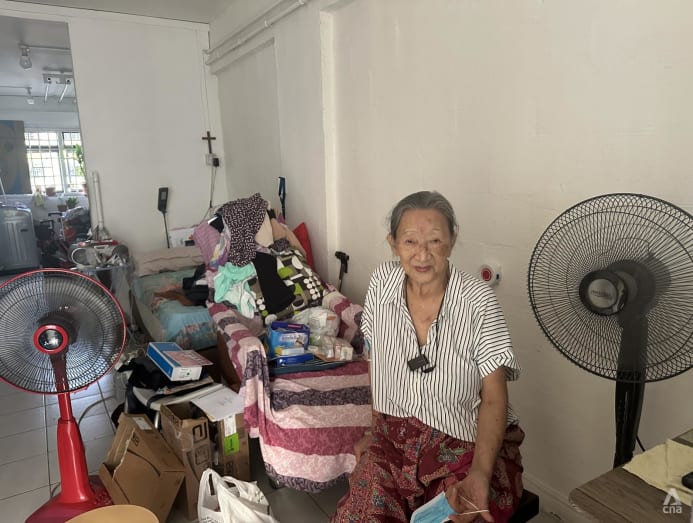
Over in Chinatown, Madam Ambon, 79, is often found sitting at the void deck of her block to pass the time. Her husband died four years ago, and she has a son living in Punggol. Her granddaughter used to live with her but moved out recently when she got married.
"Sometimes I sit downstairs, chat with whoever's around. There aren't many Malays here, mostly Chinese. Some don't speak Malay, but it's okay," said Mdm Ambon.
A Filipino neighbour occasionally stops by to learn how to cook, she said. They cannot really communicate well with each other, but make do with a mix of English and Malay.
Madam Ambon said her sister lives in the same block, just down the corridor, but they had a falling-out three months ago and have not spoken since.
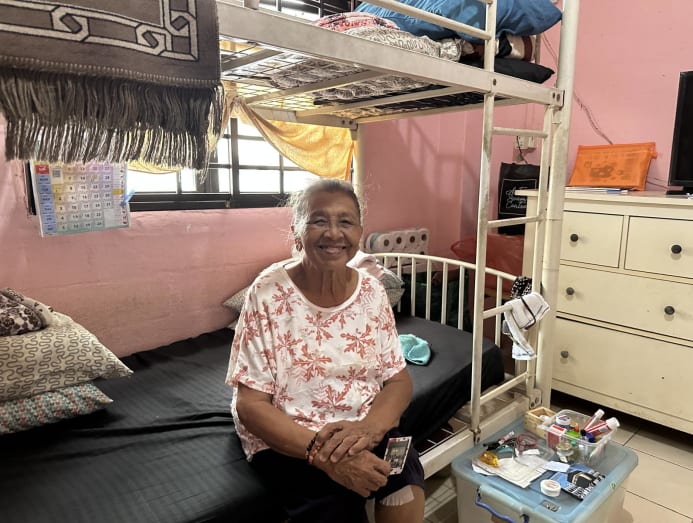
Meanwhile Mr Kelvin Tan, 63, describes living alone as "fantastic" and said he loves the freedom, adding that his friends are a group of people he cannot do without.
"There are certain things you don't share with family members. There are things you are a bit more candid about with your friends, because they don't judge you."
Mr Tan, who is divorced, said he maintains several WhatsApp groups with former colleagues and friends from various points in his life.
"I have friends who are quite close to me – not a lot, but enough to keep me busy and check on me from time to time," said Mr Tan, who used to work in finance and now works at a social service agency.
As much as Mr Tan enjoys his space and keeps himself healthy, there is an underlying worry about having an accident at home or dying alone and neighbours only finding out because of the smell.
Mr Tan said that his chat groups have an agreement to check in with each other every other day. "As long as I reply, they'll say 'Okay, you're still alive'," he said.
Even with a busy social calendar, Mr Tan does feel lonely at times, especially during festive periods.
"December always hits me quite hard because it's a festive season and you feel like you want to do something with somebody, but other people have their plans," he said.
"Everybody has a life. I have mine. But mine's a lonely life."
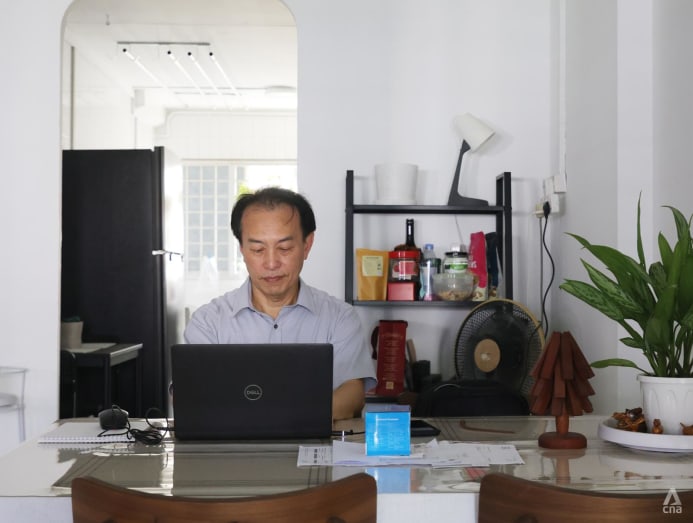
Lions Befrienders executive director Karen Wee said Singapore has made significant strides in building senior-friendly infrastructure, but noted that there are limits to how much more can be built.
She said there needs to be more of a "human element" – not in the form of more case workers, but rather for the community to come forward.
"If every three people check in on one senior, and each person spends 10 minutes, that is sufficient. You're looking at about 30 minutes a day for that senior, and that is enough," said Ms Wee.
On the ground, social workers from 4S Active Ageing Centre @ Eunos Crescent agreed that strong neighbourly camaraderie should also be encouraged so that seniors can help one another.
They added that seniors have diverse needs, so engagement has to be "flexible and person-centred" as some seniors may not be comfortable in a large group, or unable to participate in robust activities.
Assoc Prof Chan suggested Singapore could take a leaf out of Japan's Hyogo Prefecture's book on how community-driven efforts can make a tangible difference to seniors' lives.
In Hyogo, rural communities such as Sasayama City have implemented a grassroots "Happy Yellow Flag" initiative to check in on seniors living alone.
Launched in January 2019, the scheme invites participating households to display a small yellow flag each morning to signal that they are safe, and take it down at night. If a flag isn't seen, neighbours or volunteer welfare officers will follow up.
Prompted by a case of kodokushi (a lonely death) in the area, the initiative has strengthened community vigilance and fostered a sense of shared responsibility. Residents say it brings peace of mind, especially for elderly individuals living alone.
Dr Ad added that while the expansion of active ageing centres is a positive step, addressing loneliness remains difficult, as building meaningful connections takes time and is highly personal.
"Active ageing centres are premised upon being very activity-centric," he said. "The cure to loneliness is not giving people things to do. That is the cure to boredom."
He suggested that a way to tackle loneliness is by leveraging "weak ties", such as neighbours, shopkeepers and others in the neighbourhood, as these ties can help a person feel a sense of belonging and connection.
We need to normalise ageing as a basic facet of life, rather than medicalise it, said Dr Ad.
"The less we treat older people as fragile populations, the more confident seniors would feel about co-existing in the community."
WHY SOME SENIORS END UP SOCIALLY ISOLATED
Not all seniors who live alone are isolated, but for those who are, the roots often run deeper than their current living arrangements and can have significant consequences.
Studies have shown that living alone can cause psychological distress and lead to feelings of loneliness, which then contributes to the risk of mortality and depression – hence the general stereotype of living alone being sad and lonely.
But as the seniors and experts pointed out, living alone is not a definite indicator of loneliness. In fact, studies show that older adults living with their families can feel lonely too, said Assoc Prof Ghoh.
One factor that contributes to isolation is when frailty sets in, she said. It becomes difficult to perform activities of daily living, and this can limit the ability to live life as fully as before.
Assoc Prof Ghoh added that some older adults suffer from chronic illnesses in their younger years and, as they age, the deterioration of these medical conditions can lead to limitations in living well and managing life independently.
Another concern for seniors is fall risk, which increases exponentially when the senior becomes frail and has difficulty moving around freely, experts noted.
Fall risk increases when the home environment is not safe, for example, slippery floors, no grab bars and wires, carpets and objects on the floor that hinder safe mobility.
"Some seniors become homebound as they fear that they may fall if they move too much. This in turn may lead to social isolation and loneliness," said Assoc Prof Ghoh.
Assoc Prof Chan said that compared to their American counterparts, Singaporean seniors tend to stay at home after a fall, which can lead to depression, and then to lower muscle mass, with deterioration potentially occurring quite rapidly.
As such, she suggested that community health programmes, active ageing centres and community centres conduct more fall screenings and provide more education on this front.
Although there has been a proliferation of services for seniors, a gap remains in the area of screening for depression and suicide risk in older adults, said Assoc Prof Ko.
Even if the government increases its range of senior services, Asst Prof Ang said more fundamental changes are necessary if Singapore wants to tackle the risks of social isolation in old age.
"There is no quick fix, because people do not suddenly become older adults overnight. They are a culmination of decades of life experiences and circumstances," he said.
This means that people have to be able to make the best decisions for themselves at every stage of life, so that they are able to reap the benefits and enjoy a good life in their silver years, he added.
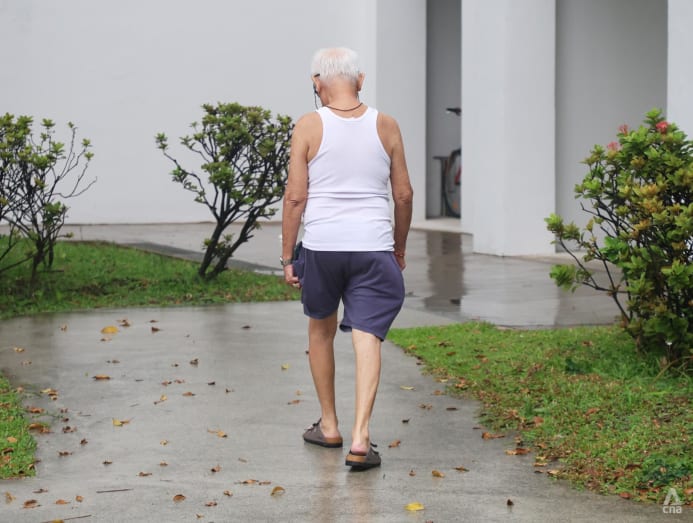
HOW TO HAVE A GOOD LIFE ALONE
Among the seniors who spoke to CNA TODAY, several said living well on their own in their old age comes down to maintaining their health and cultivating a positive mindset.
Ms Christina Lin, 70, who is single, said she is "very satisfied" with her lifestyle. A former French-speaking tourist guide, she now volunteers at Lions Befrienders and continues to take on freelance work whenever she can.
"I think it's okay to live alone. It depends on how you want to live," she said.
"If you just want to be cut off from people, then that's not very healthy. Like for me, I find it so good to be alone, but I stay connected," said Ms Lin.
For Mr Peter Tung, 67, who stepped back from his customer service job at Changi Airport in 2022, the transition to retirement was abrupt and initially difficult.
"I was miserable," he said. "But I told myself, I need to make sure I'm not lonely."
The bachelor now structures his weeks around meetups with various social circles – churchmates, former colleagues and army friends – and maintains a disciplined routine focused on walking, nutrition and self-care.
His retirement, he said, looks nothing like that of his parents'. "They mostly stayed at home, ate, took a short stroll, and came back," he said. "That is not a good retirement life."
"Exercise alone is not enough," he added. "You need the right food, the right timing, the right rest."
His advice to other seniors: Stay informed, stay mobile and don't wait until your health declines.
"You have to plan ahead. Strengthen your legs, take care of your body and be kind, so people will be there for you."
Just like Mr Tung, Ms Sylvia Tan, 80, has lived alone for nearly 40 years – and has no plans to change that.
"I'm very independent," said the former dental nurse trainer. "I've been like this since I was young."
Her days are filled with church service, senior ministry work, and community volunteering. No wonder why – she believes staying mentally and physically active is essential to avoiding isolation.
"We always encourage the seniors to look forward. They must go out and socialise. Exercise helps you stay independent, and it keeps your brain, your mind active," she said.
"And you must keep learning. I always tell myself: don't say 'I don't know how', or 'I cannot do'. I must learn.
"There's always something you can learn and when you learn new things, it widens your perspective."
ADDITIONAL REPORTING BY TAUFIQ ZALIZAN
Editor's note: Some figures in this article have been updated to more accurately reflect the number of senior residents in Singapore and divorce cases among individuals aged 55 and above. We apologise for the errors.

















